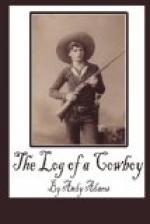After Lovell and the dons had gone, Flood ordered McCann to move his wagon back from the river about a mile. It was now too late in the day to start the herd, and we wanted to graze them well, as it was our first night with them. About half our outfit grazed them around on a large circle, preparatory to bringing them up to the bed ground as it grew dusk. In the untrammeled freedom of the native range, a cow or steer will pick old dry grass on which to lie down, and if it is summer, will prefer an elevation sufficient to catch any passing breeze. Flood was familiar with the habits of cattle, and selected a nice elevation on which the old dry grass of the previous summer’s growth lay matted like a carpet.
Our saddle horses by this time were fairly well broken to camp life, and, with the cattle on hand, night herding them had to be abandoned. Billy Honeyman, however, had noticed several horses that were inclined to stray on day herd, and these few leaders were so well marked in his memory that, as a matter of precaution, he insisted on putting a rope hobble on them. At every noon and night camp we strung a rope from the hind wheel of our wagon and another from the end of the wagon tongue back to stakes driven in the ground or held by a man, forming a triangular corral. Thus in a few minutes, under any conditions, we could construct a temporary corral for catching a change of mounts, or for the wrangler to hobble untrustworthy horses. On the trail all horses are free at night, except the regular night ones, which are used constantly during the entire trip, and under ordinary conditions keep strong and improve in flesh.
Before the herd was brought in for the night, and during the supper hour, Flood announced the guards for the trip. As the men usually bunked in pairs, the foreman chose them as they slept, but was under the necessity of splitting two berths of bedfellows. “Rod” Wheat, Joe Stallings, and Ash Borrowstone were assigned to the first guard, from eight to ten thirty P.M. Bob Blades, “Bull” Durham, and Fox Quarternight were given second guard, from ten thirty to one. Paul Priest, John Officer, and myself made up the third watch, from one to three thirty. The Rebel and I were bunkies, and this choice of guards, while not ideal, was much better than splitting bedfellows and having them annoy each other by going out and returning from guard separately. The only fault I ever found with Priest was that he could use the poorest judgment in selecting a bed ground for our blankets, and always talked and told stories to me until I fell asleep. He was a light sleeper himself, while I, being much younger, was the reverse. The fourth and last guard, from three thirty until relieved after daybreak, fell to Wyatt Roundtree, Quince Forrest, and “Moss” Strayhorn. Thus the only men in the outfit not on night duty were Honeyman, our horse wrangler, Barney McCann, our cook, and Flood, the foreman. The latter, however, made up by riding almost double as much as any man in his outfit. He never left the herd until it was bedded down for the night, and we could always hear him quietly arousing the cook and horse wrangler an hour before daybreak. He always kept a horse on picket for the night, and often took the herd as it left the bed ground at clear dawn.




